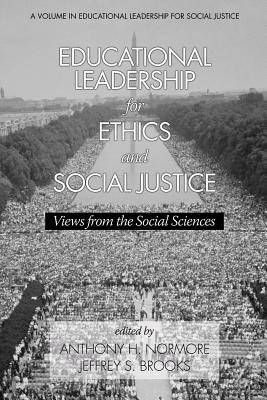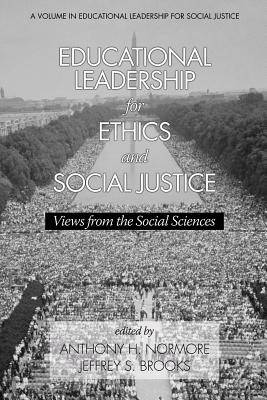
- Afhalen na 1 uur in een winkel met voorraad
- Gratis thuislevering in België vanaf € 30
- Ruim aanbod met 7 miljoen producten
- Afhalen na 1 uur in een winkel met voorraad
- Gratis thuislevering in België vanaf € 30
- Ruim aanbod met 7 miljoen producten
Zoeken
Educational Leadership for Ethics and Social Justice
Views from the Social Sciences
€ 84,95
+ 169 punten
Omschrijving
A volume in Educational Leadership for Social Justice Series Editor Jeffrey S. Brooks, University of Idaho, Denise E. Armstrong, Brock University; Ira Bogotch, Florida Atlantic University; Sandra Harris, Lamar University; Whitney H. Sherman, Virginia Commonwealth University; George Theoharis, Syracuse University The purpose of this book is to examine and learn lessons from the way leadership for social justice is conceptualized in several disciplines and to consider how these lessons might improve the preparation and practice of school leaders. In particular, we examine philosophy, anthropology, sociology, economics, political science, public policy, and psychology. Our contention is that the field of educational leadership might consider taking a step backward in order to take several forward. That is, educational leadership researchers might re-examine social justice, both in terms of social and individual dynamics and as disciplinary-specific, multidisciplinary and interdisciplinary phenomenon. By adopting this approach, we can connect and extend long-established lines of conceptual and empirical inquiry and thereby gain insights that may otherwise be overlooked or assumed. This holds great promise for generating, refining, and testing theories of social justice in educational leadership and will help strengthen already vibrant lines of inquiry. That is, rather than citing a single, or a few, works out of their disciplinary context it might be more fruitful to situate educational leadership for social justice research in their respective traditions. This could be carried out by extending extant lines of inquiry in educational leadership research and then incorporating lessons gleaned from this work into innovative practice. For example, why not more clearly establish lines of educational leadership and justice research into the Philosophy of Social Justice, Economics of Social Justice, Political Studies of Social Justice, Sociology of Social Justice, Anthropology of Social Justice, and the Public Policy of Social Justice as focused and discrete areas of inquiry? Once this new orientation toward the knowledge base of social justice and educational leadership is laid, we might then seek to explore some of the natural connections between traditions before ultimately investigating justice in educational leadership through a free association of ideas as the worlds of practice and research co-construct a "new" language they can use to discuss educational leadership. Such an endeavor may demand reconceptualization of both the processes and products of collaborative research and the communication of findings, but it will demand a breaking-down of methodological and epistemological biases and a more meaningful level and type of engagement between primary and applied knowledge bases.
Specificaties
Betrokkenen
- Uitgeverij:
Inhoud
- Aantal bladzijden:
- 234
- Taal:
- Engels
- Reeks:
Eigenschappen
- Productcode (EAN):
- 9781623965358
- Verschijningsdatum:
- 19/12/2013
- Uitvoering:
- Paperback
- Formaat:
- Trade paperback (VS)
- Afmetingen:
- 156 mm x 234 mm
- Gewicht:
- 331 g

Alleen bij Standaard Boekhandel
+ 169 punten op je klantenkaart van Standaard Boekhandel
Beoordelingen
We publiceren alleen reviews die voldoen aan de voorwaarden voor reviews. Bekijk onze voorwaarden voor reviews.










